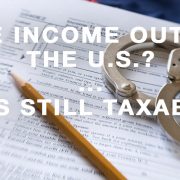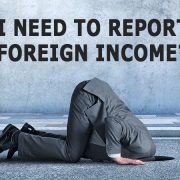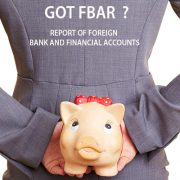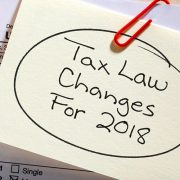Federal Court Of Appeals For The Third Circuit Clarifies Standard for Proving a “Willful” FBAR Violation
/0 Comments/in FBAR, Foreign Accounts - Litigation/by Tax AttorneyFederal Court Of Appeals For The Third Circuit Clarifies Standard for Proving a “Willful” FBAR Violation
Not much has come out of the Courts defining that line between nonwillful and willful when it comes to not filing Foreign Bank and Financial Accounts Reports (“FBAR”) but now we have a recent U.S. Federal Circuit Of Appeals case out of the Third District which has vast repercussions on anyone who has undisclosed foreign bank accounts regardless of whether they came forward in a Voluntary Disclosure Program or the Streamlined Procedures.
Bedrosian v. U.S.
In December 2018 the Federal Circuit Court Of Appeals for the Third District (the “Appeals Court”), Bedrosian v. U.S., 2018 PTC 427 (3rd Cir. 2018), on an appeal by the IRS issued its opinion determining that the taxpayer’s failure to timely file an FBAR was nonwillful. The tax law provides that U.S. citizens with accounts outside the U.S. must disclose those accounts on an FBAR if the aggregate amount is at least $10,000. 31 U.S.C. 5314. The reason the term “willful” is important is that if the failure is not willful, the penalty is set at $10,000 per violation but if the failure to disclose is considered “willful”, the penalty goes up to the greater of $100,000 or 50% of the highest account value for the year.
In the case of Arthur Bedrosian the IRS in January 2015 assessed a willful FBAR penalty for tax year 2007 of approximately $975,000, which was 50% of the undisclosed account. Mr. Bedrosian paid 1% of the penalty and then sued in Federal District Court to recover the payment as an unlawful exaction. The government counterclaimed for the full penalty amount plus interest and a late payment penalty.
Facts
Mr. Bedrosian worked in the pharmaceutical industry eventually rising to the level of CEO at Lannett Company, Inc., a company that manufactures generic medications. He had to travel abroad for business and so for convenience by 1973 had established a bank account with Swiss Credit Corporation in Switzerland (now UBS) by which he could access funds instead of paying for expenses with traveler’s checks. Eventually he started using it as a savings account and in 2005 he was approached by the bank representatives who offered him 750,000 Swiss Francs if he converts his account into an investment account. Mr. Bedrosian agreed and as a result of this transaction, another account was created under his name.
It was not until tax year 2007 that Mr. Bedrosian included, for the first time, an affirmative answer to the question on his Form 1040 Schedule B asking whether “[a]t any time during 2007, [he had] an interest in or signature or other authority over a financial account in a foreign country.” He listed Switzerland as the country. He also filed an FBAR for the first time in which he reported the existence of one of the two UBS accounts.
The IRS notified Mr. Bedrosian in April 2011 that it would be auditing his returns and he was cooperative and forthcoming in his dealings with the IRS. In the results of the audit, the IRS assessed a willful FBAR penalty for tax year 2007 of just under $1 million.
When the case was first heard by the Federal District Court, the only disputed issue was whether Mr. Bedrosian’s failure to disclose his $2 million UBS account was willful. In that case as reported in Bedrosian v. U.S., 2017 PTC 431 (E.D. Pa. 2017), the district court concluded that the IRS had failed to establish Mr. Bedrosian’s willfulness. The government appealed to the Third Circuit, arguing that the district court used an incorrect legal standard for willfulness, placed too much weight on Mr. Bedrosian’s subjective motivations, and erred in finding that Mr. Bedrosian did not know he owned a second foreign bank account.
Court’s Analysis
The Court Of Appeals stated that to prove a “willful” violation with respect to the filing of an FBAR, the IRS must satisfy the civil willfulness standard, which includes both knowing and reckless conduct.
In its analysis of “willfulness,” the court considered the taxpayers’ behaviors in U.S. v. Williams, 489 Fed. Appx. 655 (4th Cir. 2012), and U.S. v. McBride, 908 F. Supp. 2d 1186 (D. Utah 2012). The court noted that unlike those taxpayers, who continued to submit inaccurate FBARs even after being targets of government investigation, or who repeatedly lied and refused to produce requested documents, Mr. Bedrosian was cooperative with the IRS during the audit process.
Upon the IRS’ urging to consider “willfulness” outside of the FBAR context, the court also reviewed Greenberg vs. U.S., 46 F.3d 239 (3d Cir. 1994). There the court had considered whether a party had willfully failed to pay certain employer withholding taxes. It was determined that willfulness depended on the individual’s knowledge that his company had not paid the taxes at the time he paid company funds to the employees and other suppliers.
Although the court here agreed that Mr. Bedrosian should have been more careful about reviewing the 2007 FBAR and in being aware of the fact that he had not one but two accounts at UBS, the court determined that it was not apparent that he submitted it knowing that it omitted the second UBS account.
Significantly, the court summarized that the only evidence supporting a finding that Mr. Bedrosian’s violation was “willful” was: (1) the inaccurate form itself, lacking reference to the second account, (2) the fact that he may have learned of the second account’s existence at one of his meetings with a UBS representative, (3) his sophistication as a businessman, and (4) his accountant’s statement to him in the mid-1990s that he was breaking the law. The court concluded that “none of these indicate ‘conduct meant to conceal or mislead’ or a ‘conscious effort to avoid learning about reporting requirements,’ even if they may show negligence”.
Accordingly the Third Circuit then remanded the case for the district court affirming that Mr. Bedrosian did not act willfully in failing to disclose the second UBS account in his 2007 FBAR filing.
What Should You Do?
Taxpayers who have entered into the Streamlined Program whose case is weak on showing nonwilfullness have a huge risk of being picked by IRS and losing the favorable status offered by the Streamlined Procedures where the IRS feels that the non-willful standard is not met. Such taxpayers will not then be able to enter into a voluntary disclosure program and can face the same battle as Mr. Bedrosian. Likewise, anyone who has not come forward in voluntary disclosure and the issue of nonwilfullness is questionable would still have the opportunity to come forward under a voluntary disclosure program. Keep in mind that any submission must be complete or else like Mr. Bedrosian, the IRS will reject the settlement and look to assess the full penalties provided by law. Let the tax attorneys at the Law Offices Of Jeffrey B. Kahn, P.C. located in Orange County (Irvine), San Francisco Bay Area (including San Jose and Walnut Creek) and offices elsewhere in California get you set up with a plan that may include being qualified into a voluntary disclosure program to avoid criminal prosecution, seek abatement of penalties, and minimize your tax liability. Also, if you are involved in cannabis, check out how our cannabis tax attorneys can help you.
Swiss Banks’ Global Data Exchange Sunsets The Era Of Bank Secrecy
/0 Comments/in FATCA, FBAR, Foreign Accounts - Tax Information Sharing, Foreign Accounts – IRS Operations & Investigation Developments, Offshore Voluntary Disclosure Program (OVDP), Undisclosed Foreign Bank Accounts & Unreported Foreign Income/by Tax AttorneyIRS Targeting Taxpayers With Unreported Foreign Income And Undisclosed Foreign Bank Accounts
/0 Comments/in Audits, Criminal Tax Enforcement, Disclosures of Foreign Income Producing Property, Disclosures of Foreign Trusts and Interests In Foreign Entities, FBAR, Foreign Accounts - Tax Information Sharing, Foreign Accounts – IRS Operations & Investigation Developments, IRS Criminal Investigation Division Operation & Developments – Domestic Tax Issues, IRS Operations & Procedures, Offshore Voluntary Disclosure Program (OVDP), Undisclosed Foreign Bank Accounts & Unreported Foreign Income/by Tax AttorneyIRS Establishes New Criminal Investigation Group Using Big Data Analytics to Crack Down on Offshore, Bitcoin and Cannabis Tax Evasion
/0 Comments/in California Marijuana Licensing, Criminal Tax Enforcement, Criminal Tax Litigation – Domestic Tax Issues, Crypto-currency / Bitcoin, FATCA, FBAR, Foreign Accounts - Tax Information Sharing, Foreign Accounts – IRS Operations & Investigation Developments, IRS Criminal Investigation Division Operation & Developments – Domestic Tax Issues, IRS Operations & Procedures, Marijuana Tax Planning & Marijuana Tax Defense, Tax Audits & Appeals, Undisclosed Foreign Bank Accounts & Unreported Foreign Income/by Tax AttorneyAs April 17, 2018 Is Coming Up, IRS Reminds Those Taxpayers With Foreign Assets About U.S. Tax Obligations
/0 Comments/in FBAR/by Tax AttorneyWhy Taxpayers Involved In Offshore Accounts, Crypto-Currency Or Cannabis Should Be Filing An Extension For Their 2017 Income Tax Returns
/0 Comments/in Crypto-currency / Bitcoin, Disclosures of Foreign Income Producing Property, FATCA, FBAR, Foreign Accounts - Tax Information Sharing, Foreign Accounts – IRS Operations & Investigation Developments, IRS Criminal Investigation Division Operation & Developments – Domestic Tax Issues, Marijuana Tax Planning & Marijuana Tax Defense/by Tax AttorneyThe Door Is Closing – IRS To End Offshore Voluntary Disclosure Program.
/0 Comments/in FATCA, FBAR, Foreign Accounts – IRS Operations & Investigation Developments, IRS Operations & Procedures, Offshore Voluntary Disclosure Program (OVDP)/by Tax AttorneyTaxpayers with undisclosed foreign assets are urged to come forward before the Offshore Voluntary Disclosure Program (“OVDP”) closes September 28, 2018.
The IRS announced on March 13, 2018 that it will begin to ramp down the 2014 Offshore Voluntary Disclosure Program (“OVDP”) and close the program on September 28, 2018. In a statement made by Acting IRS Commissioner David Kautter, “Taxpayers have had several years to come into compliance with U.S. tax laws under this program. All along, we have been clear that we would close the program at the appropriate time, and we have reached that point. Those who still wish to come forward have time to do so.”
OVDP enables U.S. taxpayers to voluntarily resolve past non-compliance related to unreported foreign financial assets and failure to file foreign information returns. Since OVDP’s initial launch in 2009, more than 56,000 taxpayers have come forward to avoid criminal prosecution and secure lesser penalties than what the law provides. The IRS reports that through OVDP, they have collected $11.1 billion in back taxes, interest and penalties. The number of taxpayer disclosures under the OVDP peaked in 2011, when about 18,000 people came forward. The number steadily declined through the years, falling to only 600 disclosures in 2017. This decrease is not surprising given that many people have already come forward to secure the benefits of OVDP seeing the success of the implementation of the Foreign Account Tax Compliance Act (“FATCA”) and the ongoing efforts of the IRS and the Department of Justice to ensure compliance by those with U.S. tax obligations with respect to undisclosed foreign financial assets and unreported foreign income.
Tax Enforcement Continues
Stopping offshore tax noncompliance remains a top priority of the IRS. Don Fort, Chief, IRS Criminal Investigation stated that the IRS will continue ferreting out the identities of those with undisclosed foreign accounts with the use of information resources and increased data analytics. Since 2009, the IRS Criminal Investigation has indicted 1,545 taxpayers on criminal violations related to international activities, of which 671 taxpayers were indicted on international criminal tax violations.
Where a taxpayer does not come forward into OVDP and has now been targeted by IRS for failing to file FBAR’s, the IRS may now assert FBAR penalties that could be either non-willful or willful. Both types have varying upper limits, but no floor. The first type is the non-willful FBAR penalty. The maximum non-willful FBAR penalty is $10,000. The second type is the willful FBAR penalty. The maximum willful FBAR penalty is the greater of (a) $100,000 or (b) 50% of the total balance of the foreign account. In addition the IRS can pursue criminal charges with the willful FBAR penalty. The law defines that any person who willfully attempts in any manner to evade or defeat any tax under the Internal Revenue Code or the payment thereof is, in addition to other penalties provided by law, guilty of a felony and, upon conviction thereof, can be fined not more than $100,000 ($500,000 in the case of a corporation), or imprisoned not more than five years, or both, together with the costs of prosecution (Code Sec. 7201).
For the non-willful penalty, all the IRS has to show is that an FBAR was not filed. Whether the taxpayer knew or did not know about the filing of this form is irrelevant. The non-willful FBAR penalty is $10,000 per account, per year and so a taxpayer with multiple accounts over multiple years can end up with a huge penalty.
Streamlined Procedures and Other Options
A separate program, the Streamlined Filing Compliance Procedures, for taxpayers who might not have been aware of their filing obligations, has helped about 65,000 additional taxpayers come into compliance. The Streamlined Filing Compliance Procedures will remain in place and available to eligible taxpayers. Additionally, eligible taxpayers can qualify for relief under the Delinquent FBAR Submission Procedures or Delinquent International Information Return Submission Procedures.
What Should You Do?
Don’t let another deadline slip by! If you have never reported your foreign investments on your U.S. Tax Returns or even if you have already quietly disclosed you should seriously consider participating in the IRS’ 2014 Offshore Voluntary Disclosure Program (“OVDP”). Once the IRS contacts you, you cannot get into this program and would be subject to the maximum penalties (civil and criminal) under the tax law.
Let the tax attorneys of the Law Offices Of Jeffrey B. Kahn, P.C. resolve your IRS tax problems, get you in compliance with your FBAR filing obligations, and minimize the chance of any criminal investigation or imposition of civil penalties. Tax problems are usually a serious matter and must be handled appropriately so it’s important to that you’ve hired the best lawyer for your particular situation. The tax attorneys at the Law Offices Of Jeffrey B. Kahn, P.C. located in Orange County (Irvine), the San Francisco Bay Area (including San Jose and Walnut Creek) and elsewhere in California are highly skilled in handling tax matters and can effectively represent at all levels with the IRS and State Tax Agencies including criminal tax investigations and attempted prosecutions, undisclosed foreign bank accounts and other foreign assets, and unreported foreign income.
The Calm After The Storm – What’s New With OVDP?
/0 Comments/in FATCA, FBAR, Offshore Voluntary Disclosure Program (OVDP)/by Tax AttorneyPaul Manafort and Richard Gates indicted on 12 counts including tax crimes for failure report foreign income and failure to disclose overseas bank accounts
/0 Comments/in FBAR, Foreign Accounts – IRS Operations & Investigation Developments/by Tax AttorneyPaul Manafort and Richard Gates, two former top campaign officials for President Donald Trump, have been indicted on 12 counts, according to documents made public on October 30, 2017, making them the first people to be charged in special counsel Robert Mueller’s probe into 2016 foreign election interference. In a 31-page indictment, federal prosecutors alleged that Manafort and Gates engaged in unlawful activities ranging from money laundering to operating as unregistered foreign agents of the government of Ukraine to failing to disclose overseas bank accounts.
With respect to tax crimes, the indictment alleges that Manafort laundered over $18 million, income that investigators say was “concealed from the United States Treasury, Department of Justice, and others.” Gates, meanwhile, moved over $3 million through offshore accounts, prosecutors say. In total, over $75 million was discovered as a part of offshore transactions connected to the pair. These transactions investigators allege was their attempt to fail to report and pay income taxes on income that should have been reported and to fail to disclose overseas bank accounts.
Filing Requirements If You Have Foreign Accounts
By law, many U.S. taxpayers with foreign accounts exceeding certain thresholds must file Form 114, Report of Foreign Bank and Financial Accounts, known as the “FBAR.” It is filed electronically with the Treasury Department’s Financial Crimes Enforcement Network (FinCEN).
Taxpayers with an interest in, or signature or other authority over, foreign financial accounts whose aggregate value exceeded $10,000 at any time during 2015 must file FBARs. It is due by June 30 and must be filed electronically through the BSA E-Filing System website.
Generally, U.S. citizens, resident aliens and certain non-resident aliens must report specified foreign financial assets on Form 8938 if the aggregate value of those assets exceeds certain thresholds. Reporting thresholds vary based on whether a taxpayer files a joint income tax return or lives abroad. The lowest reporting threshold for Form 8938 is $50,000 but varies by taxpayer.
By law, Americans living abroad, as well as many non-U.S. citizens, must file a U.S. income tax return. In addition, key tax benefits, such as the foreign earned income exclusion, are only available to those who file U.S. returns.
The law requires U.S. citizens and resident aliens to report worldwide income, including income from foreign trusts and foreign bank and securities accounts. In most cases, affected taxpayers need to complete and attach Schedule B to their tax return. Part III of Schedule B asks about the existence of foreign accounts, such as bank and securities accounts, and usually requires U.S. citizens to report the country in which each account is located.
Penalties for non-compliance.
Civil Fraud – If your failure to file is due to fraud, the penalty is 15% for each month or part of a month that your return is late, up to a maximum of 75%.
Criminal Fraud – Any person who willfully attempts in any manner to evade or defeat any tax under the Internal Revenue Code or the payment thereof is, in addition to other penalties provided by law, guilty of a felony and, upon conviction thereof, can be fined not more than $100,000 ($500,000 in the case of a corporation), or imprisoned not more than five years, or both, together with the costs of prosecution (Code Sec. 7201).
The term “willfully” has been interpreted to require a specific intent to violate the law (U.S. v. Pomponio, 429 U.S. 10 (1976)). The term “willfulness” is defined as the voluntary, intentional violation of a known legal duty (Cheek v. U.S., 498 U.S. 192 (1991)).
Additionally, the penalties for FBAR noncompliance are stiffer than the civil tax penalties ordinarily imposed for delinquent taxes. For non-willful violations it is $10,000.00 per account per year going back as far as six years. For willful violations the penalties for noncompliance which the government may impose include a fine of not more than $500,000 and imprisonment of not more than five years, for failure to file a report, supply information, and for filing a false or fraudulent report.
Lastly, failing to file Form 8938 when required could result in a $10,000 penalty, with an additional penalty up to $50,000 for continued failure to file after IRS notification. A 40% penalty on any understatement of tax attributable to non-disclosed assets can also be imposed.
Voluntary Disclosure
The IRS has special programs for taxpayers to come forward to disclose unreported foreign accounts and unreported foreign income. The main program is called the Offshore Voluntary Disclosure Program (OVDP). OVDP offers taxpayers with undisclosed income from offshore accounts an opportunity to get current with their tax returns and information reporting obligations. The program encourages taxpayers to voluntarily disclose foreign accounts now rather than risk detection by the IRS at a later date and face more severe penalties and possible criminal prosecution.
For taxpayers who willfully did not comply with the U.S. tax laws, we recommend going into the 2014 Offshore Voluntary Disclosure Program (OVDP). Under this program, you can get immunity from criminal prosecution and the one-time penalty is 27.5% of the highest aggregate value of your foreign income producing asset holdings.
For taxpayers who were non-willful, we recommend going into the Streamlined Procedures of OVDP. Under these procedures the penalty rate is 5% and if you are a foreign person, that penalty can be waived. This is a very popular program and we have had much success qualifying taxpayers and demonstrating to the IRS that their non-compliance was not willful.
What Should You Do?
Don’t delay because if the government finds out about you first, you could be in the same hot water as Paul Manafort and Richard Gates. Taxpayers who hire an experienced tax attorney in Offshore Account Voluntary Disclosures should result in avoiding any pitfalls and gaining the maximum benefits conferred by this program. Let the tax attorneys of the Law Offices Of Jeffrey B. Kahn, P.C. located in Orange County, Long Beach and other California locations resolve your IRS tax problems, get you in compliance with your FBAR filing obligations, and minimize the chance of any criminal investigation or imposition of civil penalties.
Keep In Touch
MEET US IN PERSON
Services
- Abatement of Tax Penalties
- Audits And Tax Court
- Business Transactions
- Cannabis / Marijuana Tax Services
- Criminal Tax Investigations
- Crypto-currency / Bitcoin – Tax Representation Services
- Currently Not Collectible
- Delinquent Tax Returns
- Employment And Payroll Taxes
- Entity Formations
- Estate Planning
- Estate Planning For Non US Citizens
- Estate Tax Planning
- FATCA | Foreign Account Reporting Compliance
- FBAR | Foreign Bank Account Reporting
- Full Pay Service
- Income Tax Planning
- Innocent Spouse Claims
- IRS & State Tax Controversies
- IRS Offshore Tax Investigations
- IRS Offshore Tax Investigations
- IRS State Tax Controversies
- Offers In Compromise
- Payment Agreements
- Representation Of Tax Preparers And Other Tax Professionals
- Revenue Officer Assistance
- Tax & Estate Plannng
- Tax Liens And Levies
- Wage Garnishment











 Follow
Follow Follow
Follow